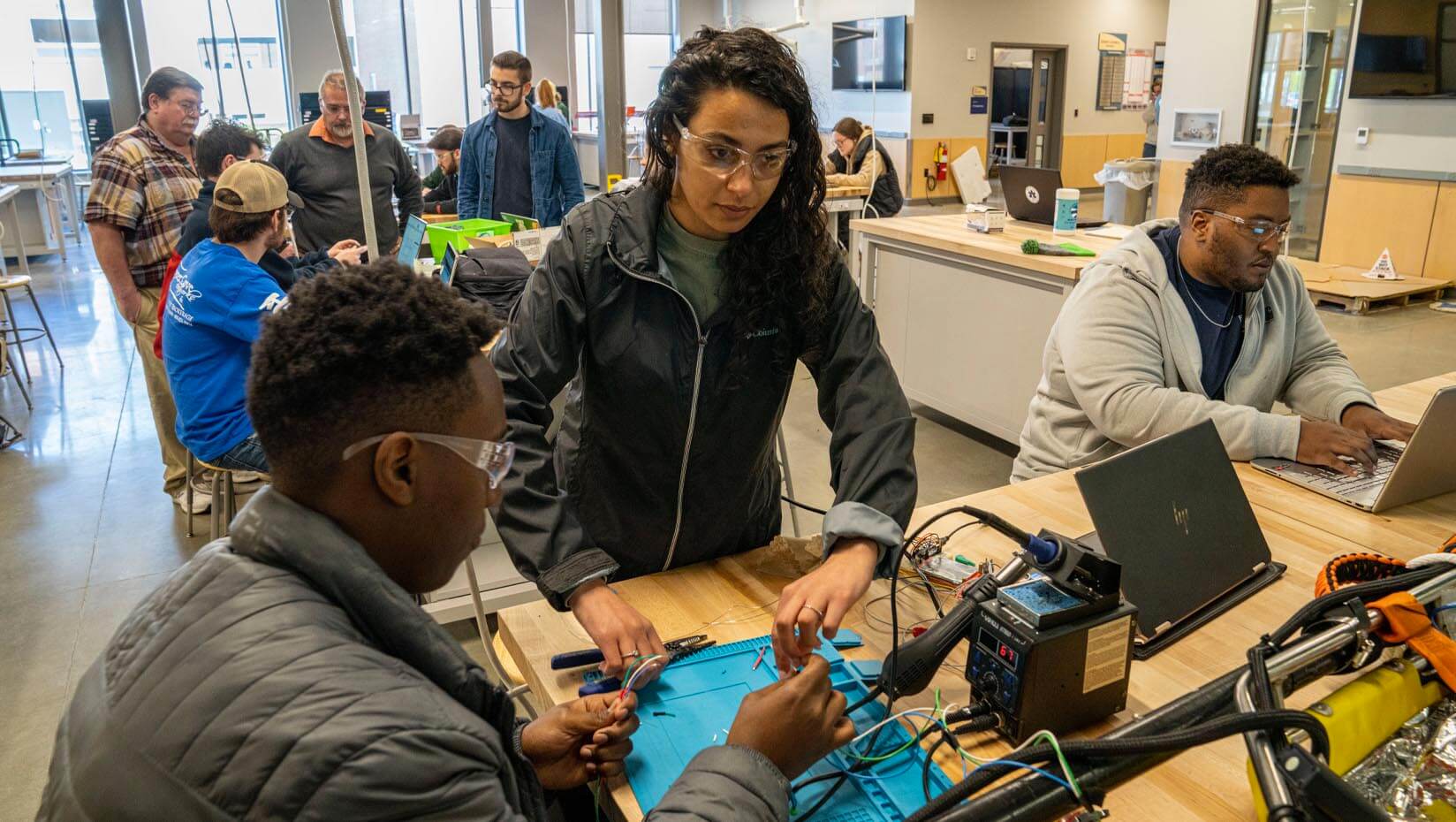
New initiative unites Maine’s innovators to bolster STEM research and workforce
An $8 million grant from the National Science Foundation will fund a four-year initiative led by the University of Maine to bolster STEM research capacity and education from Kittery to Fort Kent and dismantle systemic barriers to innovation.
Maine-SMART, or Strengthening Maine’s Research Ecosystem and Pathways Through Strategic Capacity Building, will support more than 200 early career faculty and 2,500 undergraduate students at colleges across Maine, and an additional 120 educators and 9,000 K–12 students. The new program seeks to foster collaboration between the state’s leading voices and institutions through new K–12 and collegiate curricula, outreach, development and coordination efforts.
Maine faces a shortage of skilled workers in STEM sectors. The Maine Innovation Economy Action Plan notes that Maine’s human capital in science, technology, engineering and math ranks 41 nationwide, down from 37 in 2018. Maine-SMART addresses the decline head-on by investing in educational STEM programming, including at institutions serving a vital role in supporting nontraditional students and minorities.
Partner institutions for the initiative include the Maine Mathematics and Science Alliance (MMSA), the Gulf of Maine Research Institute, the University of Maine at Fort Kent and the University of Southern Maine, with partnering institutions including Southern Maine Community College (SMCC) and the Maine Technology Institute.
“As part of Maine-SMART, MMSA will work to break down barriers to STEM education with and for our students and educators, especially underrepresented and underserved communities,” said Ruth Kermish-Allen, executive director at MMSA and one of the lead investigators for the program. “By focusing on the assets and advantages these communities have related to STEM education content, instead of what is lacking, we uncover exciting opportunities for students to become involved in research on topics that matter to them and the people they care about, strengthening Maine’s pathways into the STEM workforce.”
Maine-SMART’s workforce development objectives complement the project’s economic development focus. Through strategic investments and support, the program will help Maine attract new federal research investments and sustain economic growth. Approaches include capitalizing on existing resources by nurturing broader understanding of Maine’s existing but isolated or underutilized research assets. A more comprehensive approach to coordinating research across institutions will strengthen research and development capacity in Maine.
The new program also introduces new formal collaborations between the University of Maine System and the Maine Community College System, aiming to deepen the participation of community college students in research. Students at SMCC will kick off this effort with hands-on experiential learning activities and workshops held in conjunction with institutional partners.
“The most exciting thing about this partnership for SMCC is the ability to not only put our students in the spaces where leading-edge technology is happening to build their skill sets, but that by being supported in these spaces, the students will build confidence in their capabilities and feel prepared for STEM career opportunities,” said Erin Adams, a SMCC faculty member serving in the new program’s executive leadership.
Another goal of Maine-SMART is to support strengthening statewide engagement with Indigenous communities. In collaboration with the Wabanaki Youth in Science program, evidence-based initiatives will train STEM faculty at colleges across the state in Indigenous science and methods that will help generate new shared knowledge and collaborations.
Developing new collaborations through Maine-SMART will provide opportunities to Mainers as the state develops its STEM workforce with a community-first approach.
“With Maine-SMART, we are establishing a geographically and institutionally diverse network, each part playing an important role in Maine’s research and educational sectors,” says Kody Varahramyan, UMaine’s vice president of research and dean of the Graduate School. “Together we can streamline our efforts to provide more opportunities for Mainers by growing research and development in the state, by developing Maine’s STEM workforce, and working toward a more prosperous future for the state.”
Maine-SMART is part of the National Science Foundation’s (NSF) new Established Program to Stimulate Competitive Research (EPSCoR) Collaborations for Optimizing Research Ecosystems Research Infrastructure Improvement Program (E-CORE RII), which promotes collaboration between academic institutions, government, industry and nonprofits to build the state’s research and development capacity and infrastructure.
“Past NSF EPSCoR funding in Maine led to more than half a billion dollars in external federal investments in our state,” said Shane Moeykens, Maine EPSCoR director at UMaine and the principal investigator of Maine-SMART. “It is both NSF’s and our shared vision for Maine to leverage this new award to continue that momentum for the next 10–20 years.”
Contact: Shane Moeykens, shane.moeykens@maine.edu
